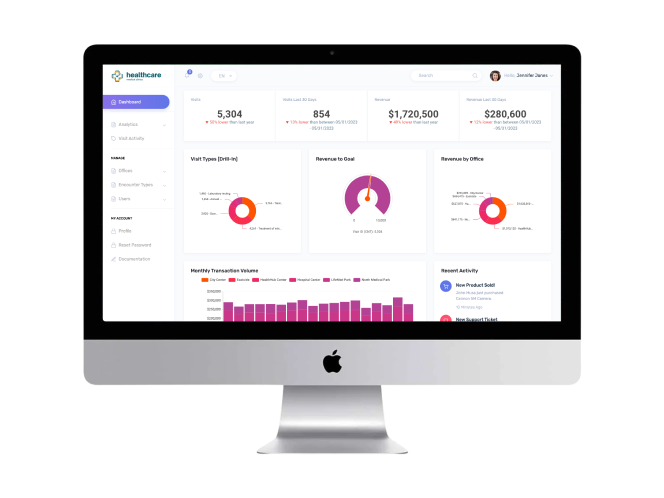
Healthcare Data Analytics for SaaS Software
Automations and alerting allow you to stay informed
Analyze payer data to find anomalies
Combine healthcare data sources to unify reporting tools
Transform your healthcare data into actionable insights

With a focus on security, Qrvey’s embedded analytics solution for healthcare analytics platforms enable teams to safely analyze sensitive data, from individual patient records to entire healthcare practice performance all within your SaaS application.
Qrvey is deployed directly to your cloud environment for industry-leading security and scalability for healthcare analytics software.
Built on serverless technology, infrastructure costs are drastically lower while still giving you the best in data security.

Qrvey ingests any data type – SQL, NoSQL, and unstructured data sources like forms and images – and enables analysis from multiple healthcare data sources on a single dashboard.
Qrvey is fully compliant with the HL7 / FHIR patient medical record standards to integrate within healthcare analytics tools.

Qrvey’s connects directly to the AWS AI suite to power real-time machine learning augmentation for your healthcare analytics solution.
Since Qrvey’ healthcare embedded analytics deploys to your cloud environment and analyzes healthcare data in real-time, this eliminates the need to copy data outside your environment or use costly third-party ETL solutions with
AI and ML.

Qrvey supports many use cases with a security-first approach. Through a healthcare embedded analytics layer built into SaaS-based healthcare analytics solutions, Qrvey accelerates time to value while allowing teams to build custom dashboards within one system.

Automations and alerting allow you to stay informed
Analyze payer data to find anomalies
Combine healthcare data sources to unify reporting tools

Ingest and analyze FHIR data with Qrvey’s API
Enable teams to drill-in to the lowest level of data
The best in security as your data stays in place

Spot trends early with comprehensive automations
Analyze trial spend in real-time
Connect to AI services for in-depth analysis

Collect real-time patient feedback
Analyze outcomes as the data comes in
Native automation and alerting to stay current

Integrate an unlimited number of data sources
Increase payment rates with real-time visibility
Multi-Tenant ready for custom dashboard building
Spot trends in real-time, support rapid decision-making and improve patient outcomes with real-time data analysis.

Efficiently scale to billions of records and increase concurrent user access while lowering infrastructure costs.
Integrated AI for predictive analytics, improving diagnostic accuracy, and personalizing patient care.
Scale analytics offering by combining data sources into a scalable central analytics layer for multi-tenant apps.
Manage data security by ensuring data quality, regulatory compliance, and effective data stewardship.
Unified data pipeline supporting integrations from enterprise systems, applications, and all data sources.
Empower users to build their own custom dashboards using Qrvey’s multi-tenant security layer and embedded builders.
Advanced data visualization tools for intuitive insights through interactive charts and real-time dashboards for healthcare.
Your success is our success. Our award willing support team is with your every step of the way.

As a self-hosted embedded analytics solution, our goal is to ensure you maintain your HIPAA compliance. Data never leaves your environment and our software is self-contained.
Qrvey takes a different approach to embedded analytics by starting with data, not charts.
Qrvey includes a full-featured data lake powered by Elasticsearch, not a basic relational caching layer. Furthermore, by including a data lake, the cost to scale out is much less than traditional data warehouses.
For the user-facing components of the platform, Qrvey offers more embedded components and APIs to personalize the experience beyond static dashboards.
Qrvey offers:
All of this is backed by a semantic layer that makes integrating Qrvey into the security model of SaaS applications simple.
Every customer has direct access to support and customer success. During your free POC period, we even give you a dedicated Slack channel where our engineers participate for those deeply technical questions.
Healthcare analytics software, sometimes referred to as medical analytics software, is important to healthcare organizations for several key reasons:
While there are many types of healthcare analytics solutions for agencies, Qrvey’s unique approach offers a multi-tenant ready solution that can speed up development time for agencies looking to serve multiple clients.
Qrvey offers every customer a free POC to test us out within your environment. We’re not here to rush you through a trial. We want you to be successful and we know that means seeing it live within your cloud platform first hand.
Healthcare analytics leverages data analysis and statistical techniques to uncover meaningful patterns and insights from the vast amounts of data generated in healthcare. By collecting and examining large datasets like patient medical records, financial records, and operational data, healthcare analytics enables data-driven decision-making and enhances outcomes in the healthcare industry.
Qrvey’s customers can expect to achieve:
It can be used for various purposes, such as predicting disease outbreaks, identifying high-risk patients, optimizing treatment plans, improving resource allocation, and evaluating the effectiveness of healthcare interventions.
Healthcare analytics enables healthcare providers, administrators, and researchers to identify patterns, trends, and correlations in the data, leading to improvements in patient care, operational efficiency, cost management, and decision-making.
Learn about Qrvey’s embedded analytics platform and get quick answers to your questions by booking a guided product tour with our experts.
Qrvey 9 is Here! ✨ Discover Multi-Cloud Embedded Analytics for SaaS. Learn More